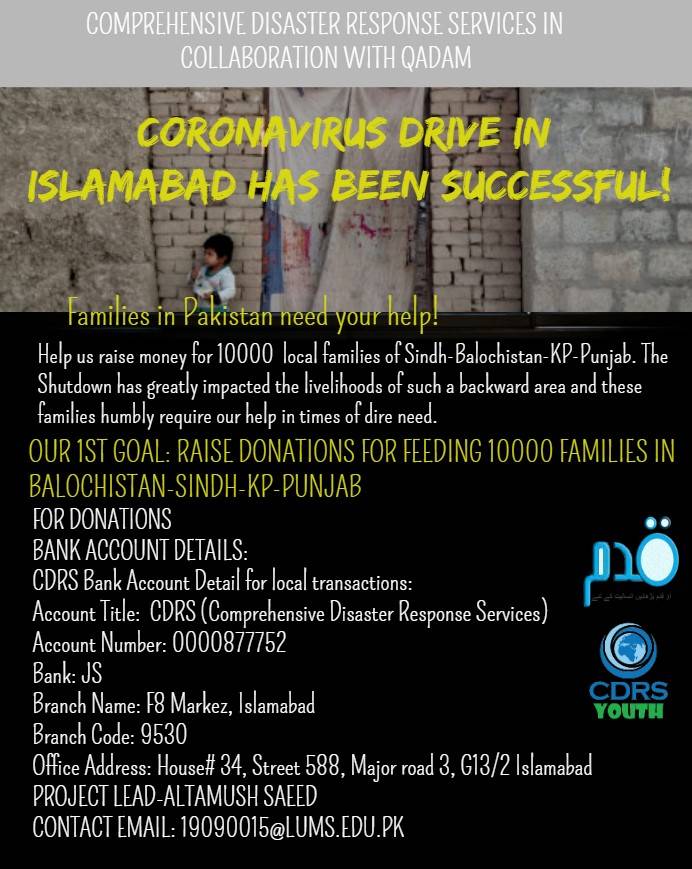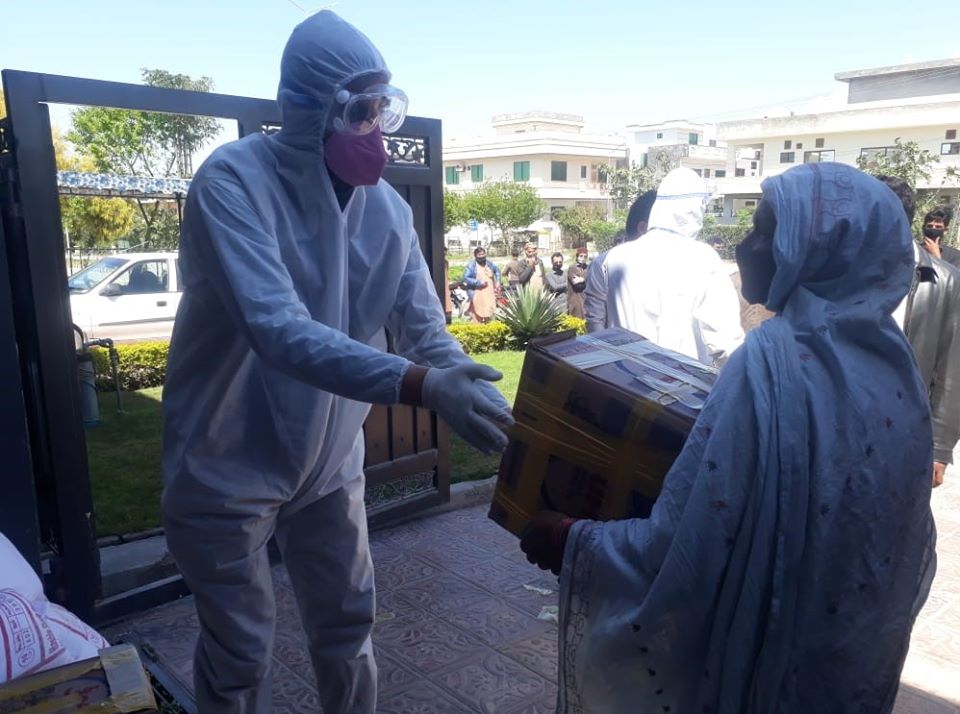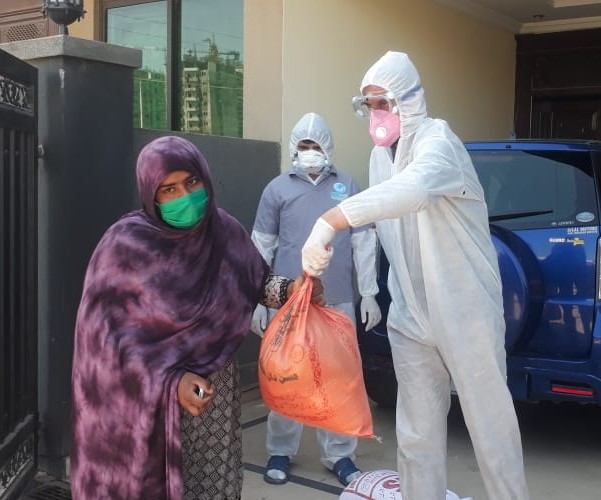
A youth activist writes about the threat that coronavirus poses to Pakistan, the need for culturally sensitive messaging for the public and the need to support country's poor population. Non-profits are attempting to make a change.
The current Coronavirus cases have spiked around 2,119 with 26 deaths reported as of April 1. The exponential rise in recent days is an alarming message. Can Pakistan afford the spiral effect and are we ready for the worst case scenario? The further spread of Coronavirus, if left unchecked and uncontrolled, will cripple Pakistan. However, for effective communication to occur, the sender of the message must understand the natural affinities of its audience. Failing to incorporate the sensitivities of the audience renders the communication of the message ineffective. This perhaps explains why, despite proper dissemination from credible organizations such as WHO, the message is falling onto the deaf ears of Pakistani citizens. Continuing religious congregations, of Tableeghi folks for instance, is one such example. Dozens of corona cases have been reported from these gatherings and many more remain undetected.
effective communication to occur, the sender of the message must understand the natural affinities of its audience. Failing to incorporate the sensitivities of the audience renders the communication of the message ineffective. This perhaps explains why, despite proper dissemination from credible organizations such as WHO, the message is falling onto the deaf ears of Pakistani citizens. Continuing religious congregations, of Tableeghi folks for instance, is one such example. Dozens of corona cases have been reported from these gatherings and many more remain undetected.
What needs to be understood is Pakistan’s distinctive demography as, unlike other Muslim countries, it is not only deeply religious but also sensitive. Closing mosques appears not to be an option. The silver lining though is that the citizens would listen to a highly reputed person from their fraternities such as a Mosque’s Imam. Secondly, another interesting feature regarding the demography is about 70-80% of the population living in what might be called as today’s Indus Valley. Herein, a significant portion of population lives in villages relying on agriculture and daily labor. Sadly, a large number of people in rural Sindh and Southern Punjab lack education and bonded labor still prevails. The patron-client relation is asymmetric and the message from the landowner carries higher effectiveness, penetration and outreach with a potential to yield more serious response rather than PM’s TV broadcasts. Moreover, Pakistan comprises a variety of regional cultures. Would information about COVID-19 shared in mere Urdu or English suffice and cater to each and every one?
Last but not the least, the discordance between the centre and provinces - both following different approaches- is a hurdle in formulating a national Coronavirus action plan, a crucial need of the hour. If the crisis goes out of control and there is no planned response and God forbid if more cases pile up, would we have enough quarantine beds, ventilators for treatment of Coronavirus patients? The government ought to be capable enough to galvanize all resources at its disposal to cater to the spiralling cases. Life is hanging by a very fine thread. We, the government and the people, must take all precautionary measures to ensure that the thread doesn’t break.
 Therefore, the NGOs have an important role to play in these perilous times. On priority basis, the daily wage laborers ought to be provided with ration bags, employed labor needs to be given paid leave.Though the government should expedite this process, NGOs too have to actively come forward and form alliances. To serve this end, a tiny effort has been made by several youth organizations such as Comprehensive Disaster Responses and Qadam, two non-profits who have joined in to launch their “Pakistan Coronavirus Relief Mission”. The mission aims to provide monthly ration that a family of 5 can utilize for at least 25 days. Their mission is to help at least 100,000 families and raise awareness about steps every individual needs to take to stop the potential spread of the virus.
Therefore, the NGOs have an important role to play in these perilous times. On priority basis, the daily wage laborers ought to be provided with ration bags, employed labor needs to be given paid leave.Though the government should expedite this process, NGOs too have to actively come forward and form alliances. To serve this end, a tiny effort has been made by several youth organizations such as Comprehensive Disaster Responses and Qadam, two non-profits who have joined in to launch their “Pakistan Coronavirus Relief Mission”. The mission aims to provide monthly ration that a family of 5 can utilize for at least 25 days. Their mission is to help at least 100,000 families and raise awareness about steps every individual needs to take to stop the potential spread of the virus.

Pakistan is in a perilous situation and a potential catastrophe knocks, necessitating a joint private-public immediate action plan to save lives of millions.
The current Coronavirus cases have spiked around 2,119 with 26 deaths reported as of April 1. The exponential rise in recent days is an alarming message. Can Pakistan afford the spiral effect and are we ready for the worst case scenario? The further spread of Coronavirus, if left unchecked and uncontrolled, will cripple Pakistan. However, for
 effective communication to occur, the sender of the message must understand the natural affinities of its audience. Failing to incorporate the sensitivities of the audience renders the communication of the message ineffective. This perhaps explains why, despite proper dissemination from credible organizations such as WHO, the message is falling onto the deaf ears of Pakistani citizens. Continuing religious congregations, of Tableeghi folks for instance, is one such example. Dozens of corona cases have been reported from these gatherings and many more remain undetected.
effective communication to occur, the sender of the message must understand the natural affinities of its audience. Failing to incorporate the sensitivities of the audience renders the communication of the message ineffective. This perhaps explains why, despite proper dissemination from credible organizations such as WHO, the message is falling onto the deaf ears of Pakistani citizens. Continuing religious congregations, of Tableeghi folks for instance, is one such example. Dozens of corona cases have been reported from these gatherings and many more remain undetected.What needs to be understood is Pakistan’s distinctive demography as, unlike other Muslim countries, it is not only deeply religious but also sensitive. Closing mosques appears not to be an option. The silver lining though is that the citizens would listen to a highly reputed person from their fraternities such as a Mosque’s Imam. Secondly, another interesting feature regarding the demography is about 70-80% of the population living in what might be called as today’s Indus Valley. Herein, a significant portion of population lives in villages relying on agriculture and daily labor. Sadly, a large number of people in rural Sindh and Southern Punjab lack education and bonded labor still prevails. The patron-client relation is asymmetric and the message from the landowner carries higher effectiveness, penetration and outreach with a potential to yield more serious response rather than PM’s TV broadcasts. Moreover, Pakistan comprises a variety of regional cultures. Would information about COVID-19 shared in mere Urdu or English suffice and cater to each and every one?
Last but not the least, the discordance between the centre and provinces - both following different approaches- is a hurdle in formulating a national Coronavirus action plan, a crucial need of the hour. If the crisis goes out of control and there is no planned response and God forbid if more cases pile up, would we have enough quarantine beds, ventilators for treatment of Coronavirus patients? The government ought to be capable enough to galvanize all resources at its disposal to cater to the spiralling cases. Life is hanging by a very fine thread. We, the government and the people, must take all precautionary measures to ensure that the thread doesn’t break.
 Therefore, the NGOs have an important role to play in these perilous times. On priority basis, the daily wage laborers ought to be provided with ration bags, employed labor needs to be given paid leave.Though the government should expedite this process, NGOs too have to actively come forward and form alliances. To serve this end, a tiny effort has been made by several youth organizations such as Comprehensive Disaster Responses and Qadam, two non-profits who have joined in to launch their “Pakistan Coronavirus Relief Mission”. The mission aims to provide monthly ration that a family of 5 can utilize for at least 25 days. Their mission is to help at least 100,000 families and raise awareness about steps every individual needs to take to stop the potential spread of the virus.
Therefore, the NGOs have an important role to play in these perilous times. On priority basis, the daily wage laborers ought to be provided with ration bags, employed labor needs to be given paid leave.Though the government should expedite this process, NGOs too have to actively come forward and form alliances. To serve this end, a tiny effort has been made by several youth organizations such as Comprehensive Disaster Responses and Qadam, two non-profits who have joined in to launch their “Pakistan Coronavirus Relief Mission”. The mission aims to provide monthly ration that a family of 5 can utilize for at least 25 days. Their mission is to help at least 100,000 families and raise awareness about steps every individual needs to take to stop the potential spread of the virus.
Pakistan is in a perilous situation and a potential catastrophe knocks, necessitating a joint private-public immediate action plan to save lives of millions.
